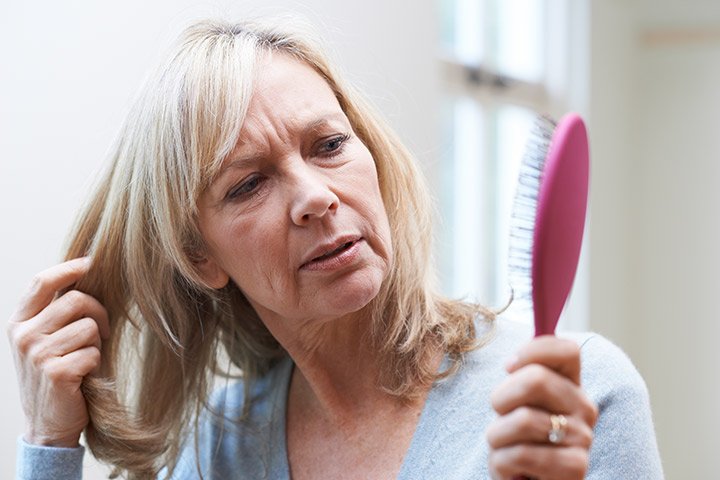Menu
From Money Worries to Family Drama: What's Stressing Your Skin & Hair the Most?

Have you ever noticed how closely linked your mind and body are? It's like they're always communicating, even when we're not tuned in.
And when stress creeps in, it's not just your mind that feels the burden – your skin and hair can take a hit too. Stress, whether it's a short-term or a long-term problem, can be detrimental to your body's health.
In fact, a recent survey by the UK’s largest independent supplier to hair and beauty professionals, Capital Hair and Beauty, revealed nearly half (42%) of the nation believe that stress has had a negative impact on their skin and hair health!
Top Hair and Skin Struggles of Last Year
Last year, Brits faced their fair share of hair and skin woes. Topping the list was the recurring issue of dry skin, affecting a significant 29% of the population. Not too far behind was hair thinning/loss, troubling over a fifth (22%) of us, while acne and breakouts are also a cause for concern, affecting 19% of survey respondents. And let's not forget about skin inflammation (12%) and eczema (11%).
| Ranking | Condition | Percentage Affected |
| 1 | Dry skin | 29% |
| 2 | Hair thinning and loss | 22% |
| 3 | Acne breakouts | 19% |
| 4 | Inflammation | 12% |
| 5 | Eczema | 11% |
What's Weighing Heavily on Brits?

Amidst the whirlwind of 2023, stress decided to crash the party for many of us across the UK. With that in mind, we delved into our survey results to uncover what exactly was keeping Brits up at night. Money matters took the top spot for over a third (35%) of respondents when it comes to their biggest stress triggers. Family drama wasn't far behind though, with 32% feeling the strain. And let's not forget about work worries – 26% of us were feeling the heat from our jobs, too. Stress, stress, go away!
Money Woes and Menopause: Unveiling Generational Stressors

Last year, it was the Gen X-ers, aged 45-54, who found themselves bearing the brunt of stress, with a staggering 30% reporting high tension levels. What's more concerning is that over a quarter (27%) of this group displayed physical symptoms of stress, such as hair loss and thinning.
Hair loss, ranked as the second most common hair and skin condition, often stems from stress. According to Lloyds Online Pharmacy, prolonged stress can prematurely halt the anagen phase of hair follicles, pushing more hairs into the telogen phase, leading to stress-induced hair loss – a struggle experienced by many in the Gen X group.
However, it's important to remember that stress isn't the only villain when it comes to Gen X and hair loss. Women in this age bracket, who are likely experiencing menopause, face hormonal changes that can also contribute to hair loss. As hormone levels decline during menopause, the body produces less oestrogen and progesterone, crucial for maintaining healthy hair.
But stress isn't sparing the younger generation either. Half (50%) of 18-25-year-olds, classed as adult Gen Z, reported moderate stress levels in 2023. And for over half (51%) of them, stress took a toll on their skin and hair quality. The main stressor? Money issues–the majority (45%) of Gen Z adults claimed that this was a significant contributor to their stress levels last year.
What's Behind Gen Z's Financial Stress?
While there are plenty of factors to consider when trying to figure out why so many Gen Z-ers are feeling the financial squeeze, one likely culprit is the unpredictability of today's job market.
According to Forbes & EY’s Generational Dynamic Study, due to mass job losses in late 2022 through to 2023, there is a feeling of distrust towards employers. The sense of job insecurity is a major stress trigger for Gen Z, leaving many working long hours to try and keep their employers satisfied.
On the brighter side, it was the more fortunate boomers who claimed the title of "least stressed" last year, with 40% of those over 65 reporting low stress levels. In even better news, half (50%) of this age group managed to avoid any pesky hair or skin issues throughout the year.
How Stress Impacts Male & Female Skin Differently

In terms of gender, our survey findings paint a picture of shared struggles between men and women when it comes to stress-related hair and skin issues. Dry skin had its grip on nearly a third (32%) of women and almost a quarter (24%) of male respondents, while acne and breakouts were reported by 21% of women versus 16% of men. And let's not forget the battle against hair thinning or loss, which affected over a fifth (22%) of men. But here's the twist–while women seemed to be more stressed out overall, with a quarter (25%) of female respondents reporting high stress levels, nearly 30% of men surprisingly claimed they were experiencing relatively low stress levels. It’s alright for some.
Where in the UK is suffering from stressed related hair and skin conditions?
Nottingham claimed the top spot as the city most affected by stress-related hair and skin issues, with over half (53%) of residents experiencing these challenges.
The top cities suffering from stress-induced hair or skin issues areas follows:
- Nottingham (53%)
- Cardiff (52%)
- Leeds (49%)
- Newcastle (47%)
- London (45%)
But what are the main concerns facing each city? In Newcastle, dry skin takes the main stage, with 38% of residents struggling with it, while an additional 17% grapple with eczema. Over in Leeds, it's all about hair troubles, with 26% admitting to hair loss and thinning. And in Belfast, 22% are tackling those pesky breakouts and acne, while in Glasgow, 18% are keeping an eye on inflammation as their main skin issue.
Bring in the Skincare Experts!
Rebecca Elsdon, advanced skin specialist, says managing stress is key to avoiding hair and skin problems...
“In our busy lives, stress is a common factor that really affects our skin. Stress triggers the release of hormones like cortisol and adrenaline. Cortisol directly impacts our sebaceous glands, making them produce more oil, and it also affects our immune system, making our skin more reactive and sensitive.
Stress-induced internal inflammation can worsen conditions like eczema, rosacea, and acne. For instance, eczema sufferers may experience intensified flare-ups, characterised by redness and itching. Acne, too, is often exacerbated, with stress triggering hormonal fluctuations that contribute to breakouts. “Beyond the visible effects, stress significantly hampers the skin's ability to heal itself. Wound healing slows down, making the skin more prone to irritations and delaying recovery from existing conditions.
To tackle these issues, managing stress through techniques and using the right skincare can help alleviate symptoms. Managing stress not only helps in preventing flare-ups but also aids in the overall improvement of skin conditions.”
Our Tips on How to Deal with Stress-Related Hair and Skin Troubles
Feeling like your stress is causing havoc on your skin? You're not alone. While we can't cut out stress completely, we can learn to manage it and in turn, minimise its impact. Buckle up, because we're about to equip you with some pro tips!
Taming Stress
- Conquer External Pressures: Is work weighing you down? Chat with your boss about lightening the load. Financial woes got you worried? Seek advice from a professional to assess your options. Remember, there's no shame in getting help!
- Dedicate Time for Yourself: Make "me time" non-negotiable. Practice saying "no" and prioritise your needs. Therapy or counselling can also serve as valuable tools for building emotional resilience. Don't forget to set time aside for stress-busting techniques like meditation or deep breathing.
Managing Your Skin Problems
- Adopt Healthy Habits: Sticking to a healthy, well-rounded diet can work wonders for your skin. And incorporating regular exercise into your routine can also yield positive results. How about giving a new fitness class a shot?
- Find the Treatment That Works for You: Be patient! Different treatments work for different people. Talk to your doctor and experiment until you find what's best for your skin.
- Lean on Those Close to You: Don't bottle up your feelings–share your struggles with friends and family. Connecting with others who understand can be incredibly beneficial. Remember, you're not alone in this! By managing stress and taking proactive steps to reduce its impact, you can regain control and feel confident in your skin–both inside and out.










